OCTOBER 17 2024
Archive Entry 2: John Ashbery's LCLC Reading (Feb. 27, 1986)
Our second video upload to the LCLC Archive (the first being the Frank Bidart reading of 2001), John Ashbery’s 1986 reading begins after my colleague Tom Byers gave his introduction. Fortunately, I have located the typescript Tom prepared.
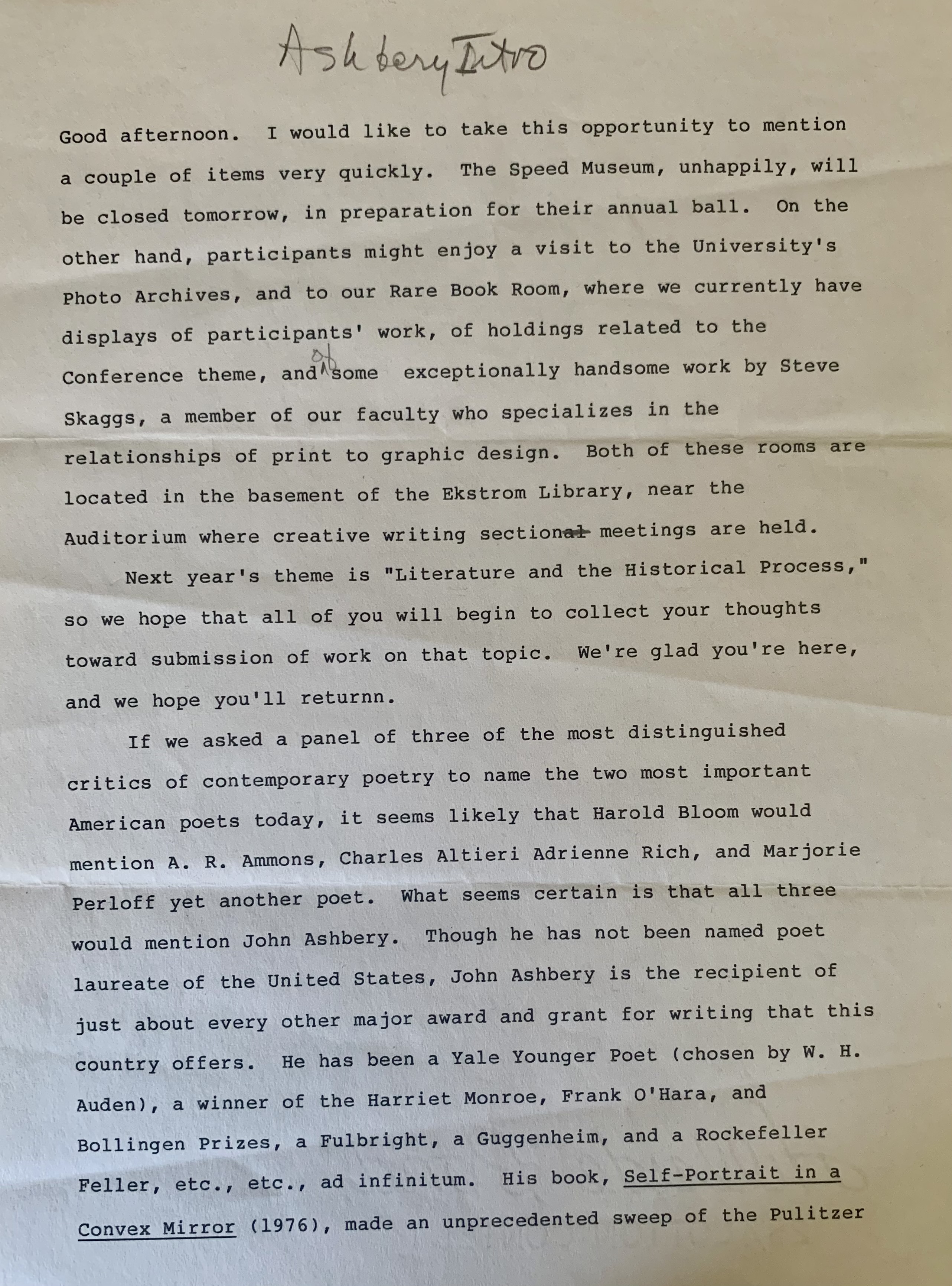
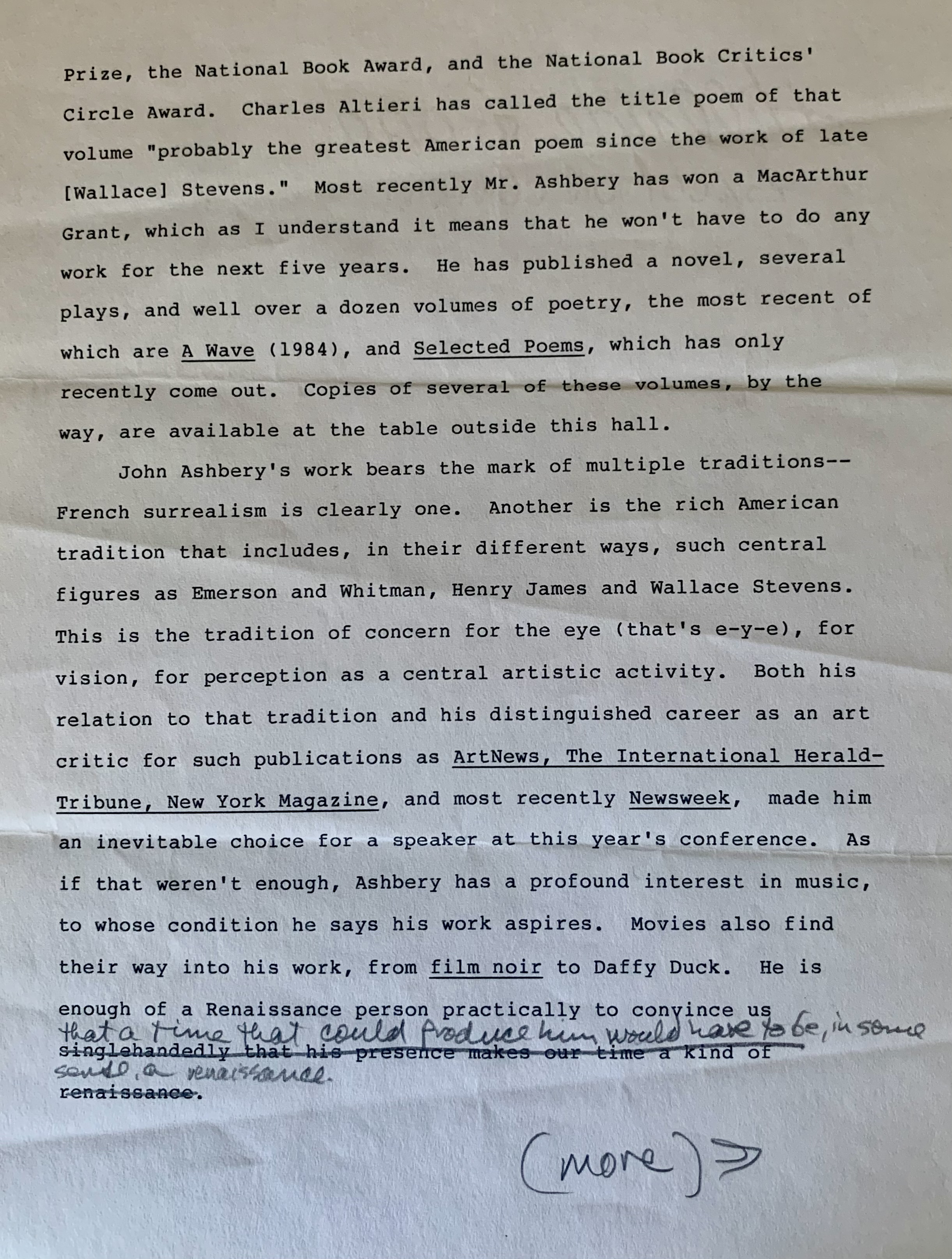
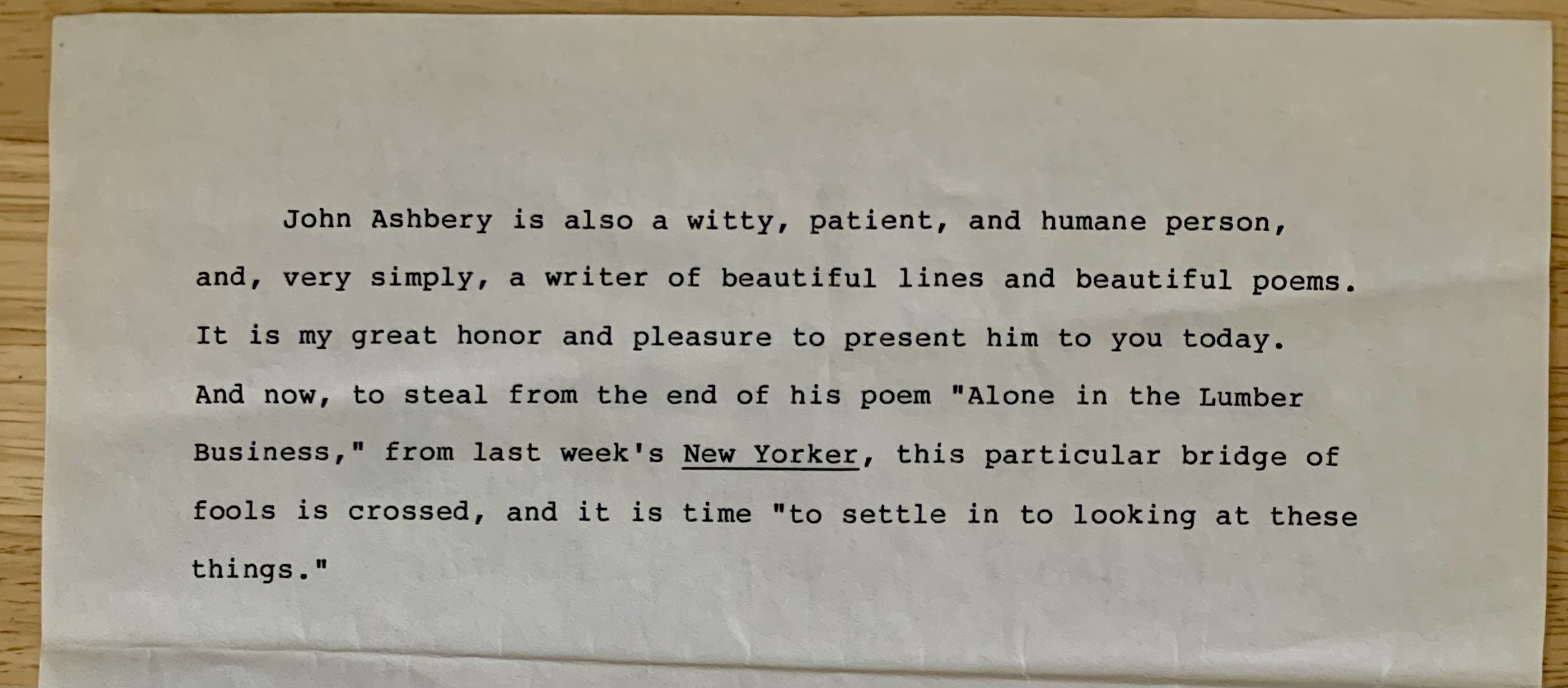
The author of the 1989 critical book What I Cannot Say: Self, Word, and World in Whitman, Stevens, and Merwin, Byers was instrumental in securing Ashbery’s participation in the conference. The introduction Tom provides is now a fascinating time capsule from an earlier epoch, before the millennial break. Reading this piece evokes for me great nostalgic longing for communal intelligibility. Consider, for example, the almost instinctive parlor game around which Byers’ constructs this introduction. He names 3 critics as arbiters--Charles Altieri, Harold Bloom, and Marjorie Perloff before going on to name Ashbery and to place him within a pantheon of what shall one call it—popular, canonical poets? Byers links Ammons with Bloom; Adrianne Rich with Altieri, but his third critic Marjorie Perloff we leaves without a clear matching poet to champion. A creature of logic, I naturally connect Ashbery with Perloff. Pondering these three pairs of names, I doubt that such a game could be played today. Perhaps that is a good thing. I leave it for my reader to decide.
What I find certain is that this introduction and the reading capture a moment in time when Ashbery was perhaps at the peak of his fame. Now a quick search on the internet suggests a significant falling off in interest among poetry readers active online. Given these circumstances, I am inclined to predict that we cannot be far away from the rehabilitation of Ashbery.
Certainly, as I review the very large stack of submissions for our upcoming LCLC52, I can’t help but see Ashbery’s influence almost everywhere. In another piece Byers discusses the so-called expansive line characteristic of late twentieth century American poetry. Ashbery was one its originators and one of its best practitioners. Again and again I encounter now in the work of young poets that expansive, metrically adroit line: it may be new-fangled in its shapes on the page, featuring lots of gaps and flows studded with stars and strange special characters, and its pop cultural references no longer feature the likes of spinach eating sailors (as in our reel from the reading), but--no mistake about it—much of this work remains animated by the spirit of John Ashbery even as he remains in partial eclipse.
SEPTEMBER 16 2024
Archive Entry 1: Frank Bidart at Mayan Café (2001)
The honorarium wasn’t much, and worse, we wanted him to teach a master class in the morning. Frank Bidart is not a morning person. The titles alone of his three long poems—The First, Second, and Third Hour of the Night—tell you that. But it is difficult for Bidart to say no.
Even that night, after his reading at the Louisville Conference, when the spotlight lends a poet some power, here he was sitting at a table with his hosts. It happened in a season before the current hiring freeze and budget cuts, but even then the University was far from generous. Hearing that I could only put his meal and mine on the conference tab, Bidart pulled out his credit card and insisted on paying for the entire table. I begged him to submit it with his expenses when he got back to Wellesley and he said he would but I knew better.
We talked about reggae. He had just read a long poem with a title swiped from the great dance hall master Desmond Dekker.
Music Like Dirt · Desmond Dekker Anthology: Israelites 1963-1999
Once a teenage rude boy, I had cued up in my head as I sat in the hall and listened to him read “Music Like Dirt” and I was still mulling over the two rhythms—Bidart’s and Dekker’s—while we enjoyed our Yucatan fare.
The thing about Bidart is that once you hear him read, you possess a key to making sense of his idiosyncratic versification. As in “To the Dead”:
What I hope (when I hope) is that we'll
see each other again,--
. . . and again reach the VEIN
in which we loved each other . .
It existed. It existed.
There is a NIGHT within the NIGHT,--
The caps denote a certain voicing that you hear again in your head when you are alone reading the poem. As do the dashes and the ellipses…
There is a NIGHT within the NIGHT,--
. . . for, there at times at night, still we
inhabit the secret place together . . .
Is this wisdom, or self-pity?--
The love I've known is the love of
two people staring
not at each other, but in the same direction.
I told Bidart this and he seemed pleased and honored to know that I had reserved a voice track for him. We talked about another Cambridge fixture—Allen Grossman, also obsessed with using words to mark out platonic architecture, what Grossman calls the Great Room in the Great House. Like Bidart, more than once I have heard dueling Grossman imitations, a true parlor game among east coast poets of a certain age.
Then I told Bidart that his work reminded me of David Ferry’s and in truth I thought the two very similar. Ferry was his chair at Wellesley. This two men knew each other intimately.
Bidart couldn’t believe what he was hearing. Evidently, it was settled doctrine to stress that here there where only stark differences.
I was pleased that he found my claim odd. I didn’t back off and Bidart quieted the table so that I could make my point because this, he wanted hear.
I said it wasn’t in the music, but in the willingness to risk everything on a single image in a poem.
Here is Ferry:
A bird cried out among the first things of the morning.
I dreamed about murders all night long.
It was the bird’s cry that startled up the stone.
The stone changed color among the shadows as the sun came up.
“A Morning Song” (full text of poem)
Here is Bidart:
Dip a finger into the River of Time,--
It comes back
STAINED.
(from “For Mary Ann Youngren”)
Bidart looked at me as if I had just pointed out a fundamental truth that had been there in front of his face and never before had he seen it.
NOTES
1) Consider Bidart on form vs. free verse:
“I think all of us on the panel, when we first heard about the panel on form, rued the prospect of one more rehearsal of the arguments about free verse versus formal verse. That's a barren distinction. The modernists did not understand their project as constituting a rebellion against formal verse or form itself. It was a far more complicated and fundamental issue. They had the consciousness of making a revolution, and the fact that our nation is founded in revolution, founded in transgression, seems to me a fundamental, recurrent theme in America's use of form.
I think you can argue that another major innovation happened with confessional poetry, both through Allen Ginsberg in Kaddish and Robert Lowell in Life Studies, and this had to do with taking seriously and incorporating into the very texture of poetry the psychoanalytic model of the search for meaning.”
Q & A American Poetry: Frank Bidart
2) Bidart’s “Music Like Dirt” was later published as a chapbook by Sarabande, the Louisville-based press run by Sarah Gorham and Jeff Skinner. The book was later short-listed for the Pulitzer and is the only chapbook to have earned that distinction.
AUGUST 26 2024
A Recap of Last Year's Conference
LCLC51 saw many of the world’s most distinguished poets, writers, and theorists in attendance, renewing its reputation as the annual event for literature lovers. With official registrations just shy of 350 attendees, the 2024 LCLC continued to satisfy with over 85 activities, beginning with 8 virtual sessions spread over Monday and Tuesday, followed by three days of in-person events (Thursday, Friday and Saturday). Certainly, the most poignant moment of the conference happened Saturday afternoon when the poetry world came together in a hastily arranged hybrid zoom session on our campus to mourn the loss of Lyn Hijinian (who died that morning). Alternating between Zoom and in-person speakers, the session brought many in the packed assembly to tears while listening to eulogies delivered from Russia to Paris, from Berkeley to Boston.
Under the directorship of Dr. Matthew Biberman (ENGLISH), LCLC51 also offered exciting new programming beyond literature, thus renewing the conference’s original mission. Matthew organized the LCLC’s first-ever joint event with the music school, a keynote conversation between U of L music professor Jerry Tolson and the Grammy award-winning poet A. B. Spellman. Other events included a panel stream on the mixed media work of the celebrated artist John Yau, including a reading by Yau and his student Ronna Lobo held at the Schneider Hall Gallery (organized by Tiffany Calvert, Professor of Art), as well as a panel on public mourning featuring sculptor (and U of L alum) Amanda Matthews whose Frankfurt Covid memorial is the first such state memorial of its kind.
Thanks to CODRE funding, the LCLC was also able to host Gladys Tzul Tzul, a Maya K’iche’ activist, public intellectual, sociologist, and visual artist who was one of the first to study Indigenous communal politics and gender relationships in Guatemala. Tzul Tzul’s appearance capped the LCLC’s Spanish offerings, highlighting the conference’s commitment to supporting the practice, study, and celebration of global art and culture.
With its virtual programming, the LCLC is now attracting participants from all over the world, and Biberman expects to see international attendance continue to grow at next year’s LCLC52.
JUNE 25 2024
Planning is now well underway for LCLC52, an event that would not be happening without the University of Louisville’s decision to hire Emily Ravenscraft as LCLC Conference Coordinator. With Emily now integrated into the workflow, I am proceeding with my podcast series and recording interviews that will comprise season 3.
This season I continue to explore how to reshape the LCLC (both as an online entity and as an in-person conference) to heighten its appeal while staying true to its impulse to serve a community committed to furthering thought through art and culture. Stay tuned for more about our lineup. I expect to start dropping episodes in August when the thoughts of certain odd birds turn to finalizing submissions for our beloved conference.
And as for me, I am back to finishing my Biberman Circle book. Today I came across this heart-stopping note from my great-granduncle, Herbert Biberman, to his adopted daughter Joan (who he calls Jone and spells phonetically in the note).
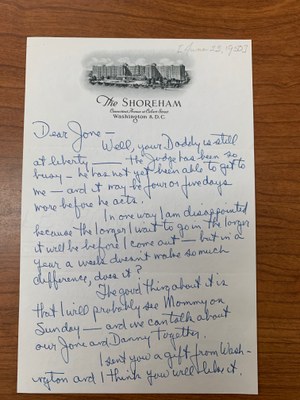
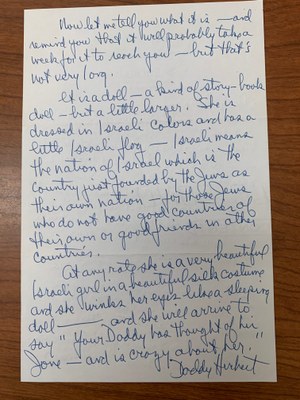
He is in our nation’s capital staying at the Shoreham on Connecticut at Calvert. He is awaiting sentencing, found guilty for refusing to testify before the House Un-American Affairs Committee (HUAC), specifically for not answering the question: are you now or have you ever been a member of the Communist Party? He writes:
Dear Jone –
Well, your daddy is still at liberty--the judge has been so busy--he has not yet been able to get to me--and it may be four or five days more before he acts.
In one way I am disappointed because the longer I wait to go and the longer it will be before I come out--but in a year a week doesn't make so much difference, does it?
The good thing about it is that I will probably see Mommy on Sunday -- and we can talk about our Jone and Danny together.
I sent you a gift from Washington and I think you will like it.
Now let me tell you what it is and remind you that it will probably take a week for it to reach you -- but that's not very long.

It is a doll--a kind of story-book doll--but a little larger. She is dressed in Israeli colors and has a little Israeli flag. Israeli means the nation of Israel which is the country just founded by the Jews as their own nation - for those Jews who do not have good countries of their own or good friends in other countries.
At any rate she is a very beautiful Israeli girl in a beautiful silk costume, and she winks her eyes like a sleeping doll -- and she will arrive to say “Your Daddy has thought of his Jone -- and is crazy about her.”
Daddy Herbert
As director of the LCLC, I know that for over 50 years this conference has served as a premiere space for creators to come together. It is a space where we seek to understand and enjoy such stories as the ones that come from this one document in the Biberman archive. That Israeli doll with her winking eyes demands scrutiny. So does the Shoreham Hotel and the courtroom where Herbert will be given the surprising sentence of six months. The ethos of the LCLC holds us accountable, exhorting us to, in the words of Rabbi Tarfon, remember that just because you will never complete your life's work does not excuse you from attempting to do so.
I understand that I must work on it and I invite you to join us for LCLC52 and share with us your life’s work as well.
DECEMBER 29 2023
LCLC51 Seminar Descriptions and Sign Up Instructions
SEMINAR ONE (THURSDAY 1:30-3:30 pm)
“Syllabus Mirabilis”: A Celebration of the Chapbooks
Seminar Leaders Jameson Welch and Krista Kane invite attendees to join them in an exploration of the vitality of material, physical chapbooks today. Participants are invited to bring chapbooks and share them so that these books can remain on display for the length of the conference. Inclined seminarians can talk about or read from their chapbooks during the session.
____
Interested conference attendees should contact Conference Director Matthew Biberman to be included.
SEMINAR TWO (FRIDAY 1:30 to 3:30)
The Art of A. B. Spellman
This seminar explores the long career of A. B. Spellman upon the occasion of the publication of New and Selected Poems. This volume compiles out-of-print poetry, previously unpublished poetry, and stunning new poetry. Participants of this seminar will come together to examine Spellman’s influence on African American poetry and culture since the mid-20th century. Mr. Spellman will serve as a panel discussant and respondent. Lauri Scheyer (editor of the forthcoming Spellman’s selected) will moderate. Confirmed participants include Meta DuEwa Jones, Ben Lee, Jean-Philippe Marcoux, Aldon Lynn Nelson, and Tyrone Williams.
____
Attendees interesting in attending the seminar as either a discussant or (possibly) as presenters are asked to contact Matthew Biberman.
SEMINAR THREE (SATURDAY 2-4pm)
Trad/Trans/After After
Across its 600 pages, Vivek Narayanan’s After (NYRB Poets, 2022) works itself out as an engagement between Valmiki’s Ramayana and constellations of modernist and contemporary Anglophone poetics. This experimental translation and epic in ever-multiplying fragments explores what it might mean to come “after,” in all possible senses. We invite seminar participants to engage with After (particularly the “translation manifesto” provided below) as a launching point for open-ended contributions, critical and/or creative, that speak to new possibilities for experimental poetics. Relevant topics might include:
- Intersections within and among the literatures and cultural productions of world mythology (including but not limited to reimaginations of Greco-Roman traditions)
- the fruitfulness and pitfalls of experimental techniques in translation
- Documentary poetics and its weavings of experimental translation and politics
- translation as traversing borders: cultural, temporal, sacred/secular
- the place of poetics in theories of translation or world literature
- the status of the fragment and its relation to epic
- current debates around translation in a global moment of possibility and retreat
In addition to the translation manifesto taken from After, we are happy to provide a digital copy of After. In the spirit of an Oulipian intervention, we suggest participants feel free to simply open After at a random page and put that page or section into conversation with their own current projects or thinking. Promiscuity is encouraged.
— John Beer, Philip Krumrich, and Vivek Narayanan (Seminar Leaders)
Sentences Toward Another Manifesto of Translation Practice (from After)
Our central anxiety about translation today is our (relatively recent) anxiety over authorship.
Long live the wonderful friendship between translation and hoaxes! Every trans- lation is a hoax at least in the sense that it is not what it claims to be: the author’s “own words.”
A new translation should be seen as an addition, not a replacement: translation is additive.
Every work of translation begins as a study. No translation is innocent.
“Faithfulness”: a foil, a cover, an alibi. “Accuracy”: when examined, always a term of imprecision.
But translation is always possible. Translation is the new art of the possible.
And translation is originality. Commentary, transcription, and calligraphy are allied original arts.
Part of the (relatively recent) conspiracy of nations in poetry is the fencing off of translations, suppressed or repressed as if they belonged to other literatures and not ours. (A few token exceptions to help police the line).
In 1857, the native sepoys of the colonial army plotted rebellion “behind the back” of the administration, in languages it hadn’t bothered to learn well enough. In the wake of this surprise—after a spell of brutal, even mindless retribution against the native city—the colonists famously set about bringing the natives fully into English. They embarked on perhaps the widest, most intricate effort of translation ever. Land tenure, customary law, you name it. Nothing should escape the predatory eye of English, no “inaccurate” or freely improvised trans- lation should ever be allowed or admitted to. It was a task of gathering but also fixing. The technology of the dictionaries they compiled helped them in this; but it also helps us, today.
And the boundary between languages no longer clear.
If translation can no longer be a consolation, what kinds of pressure and investment must it be willing to undergo? Under what terms do we endure mediocrity?
True translation is soul-fusion technology. Technology: i.e., techne.
Every translation is a collaboration among many, including all those who have come to this terrain before you. I am indebted even to those translations whose approach I reject because they gave me the benefit of having something to reject.
If nothing is to be lost, something must first be gained. All poetry is translation.
All translation is not poetry.
Translation is movement not equivalence.
Count me out—from the translation that seeks to exile the source.
_________________
Attendees wishing to join this seminar should contact conference director Matthew Biberman.
LCLC51 CONFERENCE UPDATE:
Acceptance letters have gone out! If you are expecting an acceptance letter and have not received one please contact me. The LCLC is a conference that conducts admission through a selective screening process (of “peer review”). We do not accept all papers. If you did not receive an acceptance letter please contact me to verify status. If you want additional information regarding the reasons for the exclusion of your submission from the program, contact me and I will provide it.
I am now finalizing the program and am rearranging panels in order to accommodate cancellations and last minute additions. I will be issuing a follow up email with additional details in early January. If you are reading this note and are wondering if I can add you to the program, you should email me immediately. There is a wait list and as of today, I anticipate being able to place any approved applicant onto the program.
For our next conference we are automating our submission process. To submit you will need to do so here: https://www.eventsquid.com/event.cfm?id=20913
If you have questions and/or concerns don’t hesitate to reach out. I am here to do what I can to help you join us for what promises to be a fantastic conference.
I am thrilled to be joining forces with my friend Jerry Tolson uniting with the music school here at the University of Louisville to present our kick off keynote at Comstock Hall. I look foward to hearing Jerry and A. B. Spellman exploring the links between jazz and poetry.
The opportunity to hear the thoughts of Anna Kornbluh and the literary work of Maxine Chernoff rounds out another amazing slate of speakers. But none of it would be possible without the participation of our attendees. Here at the LCLC there is so much wonderful work to take in. We want you included so please consider submitting.
Check back here for more updates. We look forward to reviewing your work!
LCLC50! It’s a Wrap!
Thanks to all attendees for making our 50th conference one for the ages! Over 400 participants gathered both in person and on-line to further a whole set of conversations, many of them now central to our various vibrant artistic communities. While it is important to reflect and to celebrate such a momentous achievement, we here at the LCLC are already excitedly planning our next confab–LCLC51.
Do you want to be a part of what promises to be the next great gathering? Please know that I and the other members of the LCLC team want you to join us, and we are happy to answer questions and do whatever we can to demystify and clarify the process so that you can.
LCLC50 saw the addition of exhibitor tables. If you are a press or a journal or offer a service of interest to our attendees we would love to hear from you.
LCLC50 saw the number of graduate students more than double from the prior year. Are you a graduate student with questions that need answering ? Again, please reach out to me.
We have added reduced pay rates for adjunct and retired faculty and we have always welcomed independent scholars or writers. We seek to include artists, writers and thinkers new to our community. Unsure? Reach out and let’s talk.
Are you unable to travel to Louisville? We are committed to offering truly outstanding on-line panels and presentations. We welcome all potential participants and encourage participants to consider presenting on-line. If you have questions, lets talk.
Finally, if you have suggestions about what we can do better, I want to hear from you. The first 50 years have been truly historic. LCLC51 promises to build on this rich tradition and break new ground.
I look forward to meeting you at the next LCLC.






